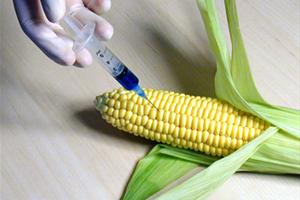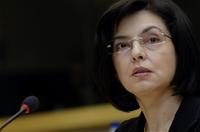GMO could turn into a unit of measurement for corruption in EU
euinside, February 14, 2010
 Has the prime minister Borisov struck a deal with the president of the European Commission Jose Manuel Barroso and for what?
Has the prime minister Borisov struck a deal with the president of the European Commission Jose Manuel Barroso and for what?
Usually the premier Boyko Borisov hears well. When people start complaining he has his own unit of measurement of dissatisfaction and reacts immediately when there is an excess of the values. But why is he so stubborn in the case of genetically-modified organisms (GMO)? He is playing the "I haven't heard, haven't seen" game. For almost 3 weeks he is refusing to meet the protesters who want to look him in the eye and talk frankly to him. In the same time he urgently arranged a meeting with the mothers of disappeared youngsters in Dobrich (a Bulgarian town in the north-east of Bulgaria) who doubted that their children could be victims of the long hands of organised crime.
Borisov is stubborn also for the GMO bill and it seems that he is not quite aware of what this legislation is protecting. He did not even know the name - he called it "a legislation for genetically modified creatures". The minister of the environment Nona Karadzhova who is also vigorously protecting the changes in the bill, allowing testing in Bulgaria of GMO hybrids and selling of the MON810 corn which is also allowed for selling in the EU, is also not quite aware what exactly do the changes in the bill say. Asked about the stricter mechanism in case of disaster with GMO, she initially looked surprised - wow, are there such things written in the law - and then called an expert of hers and specified later that this is about tightening of control in laboratory conditions.
She is also constantly explaining that the procedure for allowing GMO is very burdensome and that a permission from the European Commission is required. But this is only relevant for commercial purposes, i.e. for the Monsanto corn MON810 and does not apply for all other hybrids which will be tested on experimental fields in Bulgaria. Then we should only inform the Commission and we are not obliged to comply with its opinion. It seems that the only person that is well aware with the changes in the legislation is the deputy minister of environment Evdokiya Maneva who was blamed as being a lobbyist on behalf of the ultra rich corporations - those who hold the GMO patents. But Borisov already showed that he does not tolerate suspicions about lobbyists in his government which might play behind his back. The deputy minister of healthcare Lyubomir Gaydov was fired in the end of October last year after it was revealed that he was putting forward the interests of a large pharmaceutical company. The scandal was extinguished in its very beginning.
However, the situation with GMO is different. Why - the opposition asks? When the case started unwinding, a small detail emerged which proved to be very significant to arrange the puzzle. The deputy minister of foreign affairs Krasimir Kostov resigned in a very mysterious way. It appeared he was a collaborator with the communist secret service but this popped up during a check in the Healthcare Fund where he worked for a short period of time. But he was also presiding the European Affairs Council (EAC) at the Council of Ministers where he was responsible for preparing Bulgaria's positions in the different formats in Brussels. On the 12th of October last year Kostov announced after a session of the EAC that Bulgaria will vote abstention in all coordination procedures in the EU intended to approve or not the usage of GMO foods in the Union. Kostov even went further by saying that the new government had doubts that the decisions to approve GMO foods were taken in obvious conflict of interest since a check showed the approvals were given too easy.
unwinding, a small detail emerged which proved to be very significant to arrange the puzzle. The deputy minister of foreign affairs Krasimir Kostov resigned in a very mysterious way. It appeared he was a collaborator with the communist secret service but this popped up during a check in the Healthcare Fund where he worked for a short period of time. But he was also presiding the European Affairs Council (EAC) at the Council of Ministers where he was responsible for preparing Bulgaria's positions in the different formats in Brussels. On the 12th of October last year Kostov announced after a session of the EAC that Bulgaria will vote abstention in all coordination procedures in the EU intended to approve or not the usage of GMO foods in the Union. Kostov even went further by saying that the new government had doubts that the decisions to approve GMO foods were taken in obvious conflict of interest since a check showed the approvals were given too easy.
At the same time, the minister of agriculture Miroslav Naydenov has another job in the EU. On November 20th 2009 at a regular session the Agriculture and Fisheries Council (the meeting of EU agriculture ministers) decided to allow import to the EU of foods, products and forage from GMO American corn. The decision was taken with the decisive vote of minister Naydenov, otherwise it wouldn't have been possible. This also appears in contradiction to the decision of the EAC. Has he decided to vote positive on his own, without the prime minister to know this? No one is actually asking this question because even kids in Bulgaria know that Borisov is holding the grip tight. Recently the former premier Stanishev said something which sounded oracular - that the GMO scandal would be something very similar to what happened with the nomination of Rumyana Zheleva for a European Commissioner and will again unwind on a European territory.
According to opposition's research, the greatest lobbyist of GMO in the European Commission is its president Jose Manuel Barroso because he is thought to have concluded a lucrative deal with the Bulgarian prime minister. As there is no GMO majority in the EU and there can hardly be any, the Commission's president acted differently - he agreed directly and bilaterally with certain EU prime ministers. He requested Boyko Borisov to give him a liaison person and probably this is the agriculture minister Miroslav Naydenov. According to a foreign non-government organisation in the middle of October there was an unofficial working meeting where different commitments were taken for Barroso. A month later Naydenov voted "yes" in the Agriculture and Fisheries Council and on November 27th changes in the GMO legislation were introduced in the Bulgarian Parliament, fully liberalising the market for scientific and commercial purposes.
In the parliamentary Environment Committee the bill passed only with the votes of the ruling party GERB and their partner, the nationalist party ATAKA. The members of parliament from bot parties were not aware what exactly they were doing. Lachezar Toshev from the Blue Coalition voted against. The coalition itself is totally split on the issue and this is the reason why its co-chairmen preferred to keep silence. On the one hand Evdokiya Maneva who is from the DSB side of the coalition is a deputy minister of environment and supported the bill, while Toshev, who is from the Union of Democratic Forces - is against. No wonder what ground political hypocrisy can reach.
The background
The president of the European Commission Jose Manuel Barroso outlined as his priority for his second tern in office the genetically modified organisms. In October 2008 he initiated a campaign for GMO foods distribution in EU. This was reported by the Sunday edition of the Independent newspaper, quoting confidential documents from meetings of the working groups, where all member states are represented. Barroso, who according to the daily, is a supporter and advocate of GMO foods, requested the 27 leaders to send a representative to take part in the working group that discussed the issue.
The first meeting was on July 17th and the second - on October 10th 2008. On these sessions plans for acceleration of the introduction of GMO cultures and foods on the European market were discussed as well as methods to quell social unrest. In Britain there is a vigorous Resistance against GMO, and in Spain and Portugal which grow such crops, the opponents constantly grow. France which allowed GMO, froze the permission. With a letter from May 5th 2009 the Portugal informed the Commission of its intention to announce Madeira autonomous region as a free of GMO zone.
Currently 7 European countries grow GMO - Spain, Portugal, Germany, the Czech republic, Poland, Slovakia and Romania. Barroso became a supporter of GMO yet when he was a national politician in Portugal. On April 6th 2002 he became prime minister of Portugal and before that he presided the Foreign Affairs Committee in Parliament. On November 1st 2004 he became resident of the European Commission and now he was approved to lead the Commission for a second term. This can easily be felt in the GMO area.
In 2005 21 countries grow biotechnological crops (GMO) unlike a year earlier when those countries are only 17 around the world. Three of the new ones are members of the EU - Portugal, the Czech Republic and France and the fourth one is Iran. Portugal and France renewed GMO corn cultivation in 2005 after a 5 and 4-year break, respectively, while the Czech Republic cultivated bio-technological corn for the first time in 2005. Then the country became a full fledged EU member state. Given all this, it is right to ask ourselves is there pressure from Brussels on other new member states to cultivate GMO? And is it possible that the GMO would turn into a unit of measurement of corruption in the EU?
These days there was another scandal in Brussels after the France Press reported that the European Commission president Barroso wanted to renew the process of allowing cultivation of two types of GMO in EU right after his second Commission was approved. The purpose is to open the door for Monsanto's corn MON810 and the Amflora potatoes. In Bulgaria there was also a strong pressure before our EU membership, related to GMO.
"Bulgarian MPs approve laws which are not only contradictory to European directives for bio-technology work. They are also against development of science and advanced research of Bulgarian scientists", said in 2004 Dr Dimitar Dzhilyanov from the Agrobio Institute in Sofia. The GMO legislation is lagging in Parliament since 2003 and it was not sped up even after the positive estimation, given by Brussels, the scientist said who is a supporter of the mutants.
The then minister for European affairs Meglena Kuneva took the same position. According to her, the approval of the GMO legislation before Bulgaria's accession to the EU was more than imperative. But between the first and second reading two new texts in the law appear, which fully ban laboratory research on animals, rose, vine and tobacco as well as on the work in experimental bases and scientific departments. It is considered that the restrictive texts were put forward by Theodora Litrova, an MP from the "Oborishte" movement.
 What is the role of Meglena Kuneva?
What is the role of Meglena Kuneva?
We can only guess because Kuneva herself has not spoken on the issue during her time as a European Commissioner on Consumer Protection policy. She was many times informed by Bulgarian NGOs regarding doubts that in some products, sold in Bulgaria, there are intolerable quantities of GMO. But she never gave a clear response. This became something like a taboo-issue for her.
However, during the hearing of her successor in the European Parliament - the Maltese John Dalli, who aside from Consumer Protection is taking also the portfolios of Healthcare, the MEPs bombarded him with questions about GMO usage in foods and about the use of cloned animals. Mr Dalli responded that products and forage with GMO origin should be well labeled. Something similar said his predecessor Ms Kuneva. According to Dalli a big problem was how to label products as many producers complained that this raised the costs of their production additionally. Quite often the labels were illegible too. This remained an unsolved issued from the term of Ms Kuneva.
The problem with GMO is extremely complex because "this is not only about what we put on our table. There are issues regarding international relations, food security in the future and given this complexity, the decisions should not be one-sided or taken quickly", the new Commissioner John Dalli said. What more can we expect from the admission that this is about policy and a lot of money.